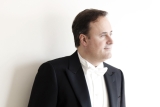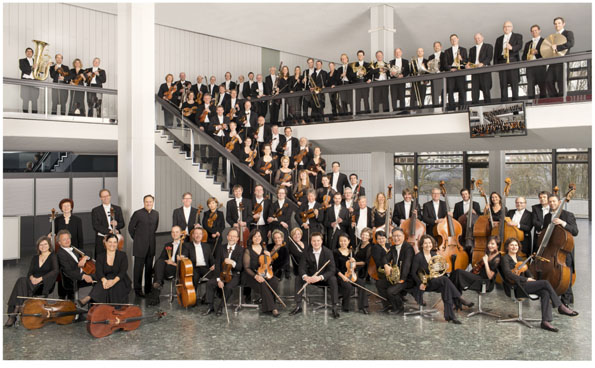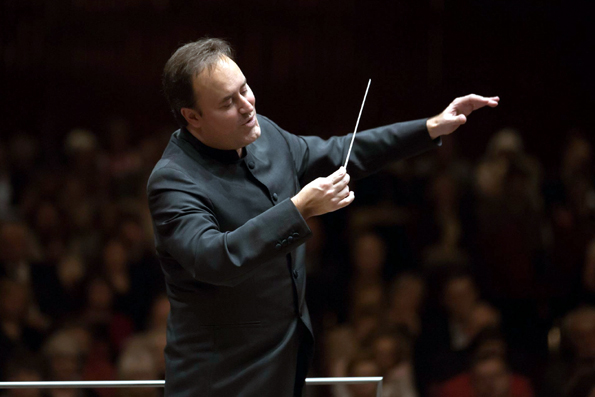Maestro Chichon, where do you see the DRP currently in Germany’s orchestra landscape?
I see the DRP as one of the leading radio orchestras of Germany and definitely the leading orchestra of the region. The question now of course is how we continue to increase that quality and how we make this orchestra better known throughout Germany. This is something that is presently being discussed in detail and it will be exciting and interesting to see where it will leads us.
Dvorak will be your favorite composer in this season. You will conduct a number of lesser known works. Do you think that this music matches the one of his best known compositions?
I believe the issue is not if the music is less or better known but, instead, the quality of these compositions. We scored an enormous public and critical success in Saarbrucken and Brussels with Dvorak’s Symphony No. 1 which is the least known of all his symphonies. Many throughout the world have denounced this work to be of little quality, but I think it is much more about how one presents the symphony and the detailed care one gives it.
You will also make a series of Dvorak recordings. What does the recording activity mean to you?
Recording activity is firstly the best available means to have the orchestra exposed in international circles and, secondly, a testament of the work that we have done together over the years.
Do you prefer live or studio recordings?
I have no preference in general terms, although I prefer studio recordings if the orchestra is performing the music to be recorded for the first time.
Beethoven and especially his choir music will be another major topic in your new season. Could you please explain this choice.
I come from a rich tradition of choirs. I was an organist and held my first position as Choirmaster of the Cathedral of Gibraltar at the age of 15. Then when I studied in London I was fortunate enough to submerge myself in the great choral traditions of England. Therefore choral music is in my blood. At the same time opening the season is always an important affair which one must take care in presenting properly – a work that will give the public a chance to hear something new (like the deutsche premiere of Dzenitis’s Preludium Light) and a work that defines the present qualities of the orchestra and where it will lead us during the season – a kind of vision of the season. I believe our opening concert, with Dzenitis and Beethoven’s 9th symphony, does just that.
Your orchestra will tour a lot and also play again in Asia. Such a touring is expensive. Do you think that the result, at the end, is really important for your orchestra?
Touring is indeed expensive but it is the promoters who pay for this expense, not the orchestra nor the SR/SWR. In my view the most important market that we need to concentrate on is Germany, since I sometimes feel we are the « best kept musical secret » in Germany and we need to get out to do more concerts in important musical centres throughout Germany, but in general terms of course all markets are important.
You often conduct concerts in which your wife Elina Garanca is singing. Is this an easy artistic collaboration? What’s the difference from conducting with other singers?
My artistic collaboration with Elina is as easy and difficult as it can be with any other artist because when we work together we do not consider ourselves husband and wife but rather artistic partners. When we agree then it is great, but when we disagree, it can also be not so nice. Of course there are many musical advantages. I know Elina’s voice better than any other conductor and I can support her probably better than any other conductor too. From my side there is no singer I would rather work with than Elina because she approaches singing from a musical point of view, rather than a vocal one. Orchestras in general feel comfortable performing with her because she approaches her art in a highly intelligent and musical manner.
Therefore I feel we can make music together without worrying if certain musical points will happen or not – at the end it is a highly musical trust that we have for each other and that is of course a luxury.
How do both of you manage to combine a career with family life?
The key is great organization for both of us. We spend more time discussing our dates together in front of our diaries than anything else.
You spend a lot of time conducting operas, so, what is more important to you, opera or symphonic music?
As a conductor it is possible to conduct symphonic music if you already conduct opera, but it is not possible to conduct opera if you only conduct symphonic music. Technically speaking opera conducting is much harder than symphonic music and I believe one cannot survive with just one of these genres. It is a little like asking a human being to live only with winter all his life without summer. You need both to complement each other.


























